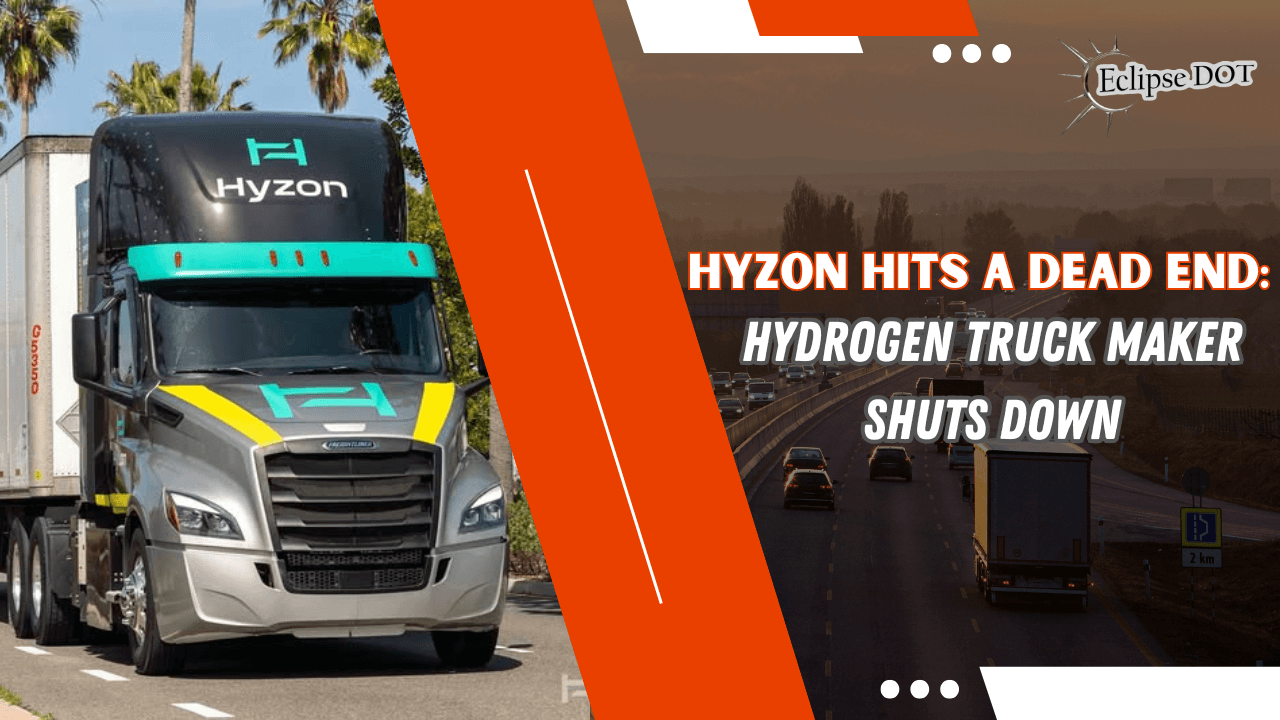(Photo Credit: Hyzon Motors)
Well, folks, another hydrogen-powered dream just ran out of gas—literally. Hyzon Motors, once hyped as the next big thing in zero-emission trucking, has officially shut down as of February 18, 2025.
What started as a bold mission to put 40,000 hydrogen trucks on the road by 2025 ended in boardroom votes, liquidation notices, and a whole lot of financial smoke. The company, once seen as a pioneer in hydrogen fuel cell technology, simply couldn’t outrun its cash burn, production delays, and an industry that’s still figuring out whether hydrogen trucks are the future—or just a really expensive science project.
So, what exactly happened? Why did Hyzon go from making headlines to making its employees update their LinkedIn profiles? Buckle up—this is a crash course in how NOT to run a trucking startup.
Hyzon’s High Hopes: The Hydrogen Dream That Didn’t Pan Out
Let’s rewind a bit.
Hyzon was spun off in 2020 from Singapore-based Horizon Fuel Cell Technologies and quickly made waves in the zero-emissions space. They promised to revolutionize the trucking industry with hydrogen-powered rigs, offering a cleaner alternative to diesel and a better range than battery-electric trucks.
By 2021, they were delivering fuel cell trucks and attracting big-name customers like Performance Food Group and Greenwaste. They even landed a SPAC deal that took them public, raking in millions from investors who believed in the hydrogen trucking revolution.
Fast forward to September 2024, and Hyzon finally rolled out series production of its 200-kilowatt Class 8 hydrogen truck at a facility in Charlotte, North Carolina. They even launched fuel cell production in Bolingbrook, Illinois—a move that should’ve signaled their arrival as a major player in the hydrogen trucking space.
But behind the scenes, things were falling apart.
Where Did It All Go Wrong?
Hyzon wasn’t just running on hydrogen—it was running on a financial ticking time bomb.
🔻 Q3 2024 losses: A brutal $41.3 million—for just one quarter.
🔻 Debt overload: $369 million in accumulated losses since they went public.
🔻 Revenue? Laughable. Just $134,000 in Q3 2024—which, let’s be real, wouldn’t even cover fuel costs for a decent-sized fleet.
🔻 Cash reserves tanked: Down to $30.4 million, compared to $112.3 million at the start of the year.
In other words, they weren’t just running low on fuel. They were running on fumes.
Government incentives—especially California’s Hybrid and Zero-Emission Truck and Bus Voucher Incentive Project—weren’t kicking in fast enough. Customers who had shown interest started hesitating, delaying, or outright canceling orders. The demand wasn’t there yet, and Hyzon simply didn’t have the cash reserves to wait it out.
In December 2024, things got even worse. The company sent out WARN notices to employees in Illinois and Michigan, signaling that mass layoffs were on the horizon. At this point, senior executives started quietly jumping ship, updating their resumes, and preparing for the inevitable.
The Final Countdown: Leadership Shakeups & A Desperate Search for a Buyer
As things crumbled, Hyzon’s leadership played musical chairs.
In August 2022, co-founder Craig Knight was pushed out and replaced by Parker Meeks, a former McKinsey & Co. exec who was supposed to clean up the mess.
By March 2023, Meeks was made permanent CEO, but let’s be real—by then, the ship was already sinking.
By February 4, 2025, Meeks stepped down (or was politely shoved out the door), and Chief Technology Officer Christian Mohrdieck took over. His job? Ride the company straight into liquidation.
Meanwhile, Hyzon’s board was scrambling to find a buyer, an investor, anyone willing to bet on hydrogen trucks. But no one took the bait.
The final blow came on February 13, 2025, when shareholders voted to dissolve the company. Five days later, Hyzon officially ceased operations.
Just like that, the hydrogen truck maker was gone.
What This Means for Hydrogen Trucking
Hyzon isn’t the only one struggling. Other hydrogen truck companies are also hitting major roadblocks.
🚛 Nikola Motors has had its own rollercoaster ride of financial disasters, stock plunges, and leadership scandals.
🚛 Quantron is still fighting to survive in an industry that’s moving slower than investors expected.
🚛 The entire hydrogen trucking movement is at a crossroads.
The problem? Infrastructure.
Hydrogen fueling stations are still rare, making it harder for fleets to justify switching from diesel. Add in high production costs, supply chain headaches, and uncertain government incentives, and you’ve got a recipe for disaster.
Electric trucks, on the other hand, are gaining traction. Major truck manufacturers—Daimler, Volvo, and PACCAR—are investing in battery-electric rigs while keeping hydrogen on the back burner.
What’s Next?
Hyzon’s collapse isn’t the end of hydrogen trucking, but it’s a massive reality check for the industry.
The lesson here? Big ideas need big money and even bigger execution.
Hyzon had the dream, the tech, and the hype—but not the runway to get their trucks rolling. In trucking, if you can’t deliver, you’re done.
For now, the zero-emission trucking future still belongs to diesel-electric hybrids and battery-powered rigs. Hydrogen might still have a place in long-haul trucking, but companies betting everything on it better be prepared to burn a lot of cash before they see results.
So, is hydrogen trucking a pipe dream, or is this just a bump in the road? Drop your thoughts in the comments!
Gain exclusive access to our CDL & DOT Compliance articles with a trial at DOTDocs.com. And don’t forget to claim your FREE micro audit at THE ECLIPSE DOT MICRO AUDIT. Ready for seamless operations? Discover the difference today!


